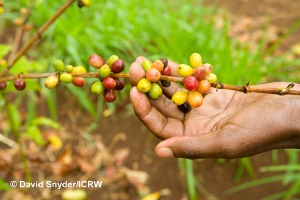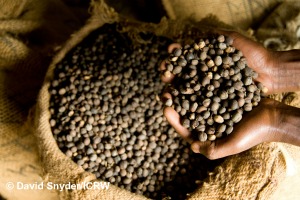
Liquid gold
Media Contact
Over the years, I have seen evidence time and again of the impact even small investments – if done right – can make in the lives of rural women.
In December, I was reminded of one of those moments while in Dar es Salaam, the capital of Tanzania. I was in the country as part of an ICRW team to set up network of practitioners to share ideas and challenges on how to effectively integrate women farmers into agricultural development projects across the country. The initiative is funded by the Bill & Melinda Gates Foundation.
But several years prior and far from the dusty streets and sultry Indian Ocean breezes of Dar, I traveled to a remote corner in the country’s southwest. Its lush, rolling hills are supported by an intricate patchwork of small fields of corn, vegetables, fruits and, importantly, coffee trees.
L ike many parts of the world, the women I met – wives, daughters, sisters and mothers, all of them farmers – were charged with the very time-consuming and labor-intensive work of processing crops before they are sold. During harvest season, they spent days washing coffee beans by hand and preparing them for men to take to market where they would sell them to traders. However, the women farmers told me that they often saw little of the money their hard work had helped earn. Sometimes they didn’t even know the price the coffee beans had fetched, leaving them uncertain about their household’s true income.
ike many parts of the world, the women I met – wives, daughters, sisters and mothers, all of them farmers – were charged with the very time-consuming and labor-intensive work of processing crops before they are sold. During harvest season, they spent days washing coffee beans by hand and preparing them for men to take to market where they would sell them to traders. However, the women farmers told me that they often saw little of the money their hard work had helped earn. Sometimes they didn’t even know the price the coffee beans had fetched, leaving them uncertain about their household’s true income.
This changed when a wet mill was introduced into the community. This simple piece of modern equipment drastically slashed the time women dedicated to washing the beans. The mill freed up valuable hours in the day in which women could engage in other income-generating activities, child-rearing duties or household tasks – to the benefit of the whole family.
 Using the mill included an option to sell the coffee beans directly to the wet mill operators, ensuring a fairer price than traders often offered. At the mill, the men received a cash receipt showing the value of the coffee and the payment the farmer would receive when the coffee was eventually sold outside the village. When the cash receipts came home, women could see exactly how much the coffee earned.
Using the mill included an option to sell the coffee beans directly to the wet mill operators, ensuring a fairer price than traders often offered. At the mill, the men received a cash receipt showing the value of the coffee and the payment the farmer would receive when the coffee was eventually sold outside the village. When the cash receipts came home, women could see exactly how much the coffee earned.
Just a few numbers on small scraps of paper can go a long way: they empowered women farmers with critical information. Women now knew just how much money was available to invest in things they considered a high priority like their children’s education or a new roof to keep the house dry and the family healthy. The receipts also equipped women with knowledge they could use to have a voice in critical household decisions.
An increased injection of smart investments tailored for women farmers – a village wet mill, portable irrigation pumps or even mobile phone technology that can help them reach their own markets for their farm products – can boost growth in rural areas where the majority of the world’s poor live. The economic and social returns for these women and their communities can be high.
I asked a group of women coffee farmers if they had ever tasted the end product – a cup of coffee – that would eventually be culled from their beans thousands of miles away. “No,” they replied. It was too precious: it brought income and a chance to have a say over how their meager household resources would be managed — powerful options for a poor rural woman.
